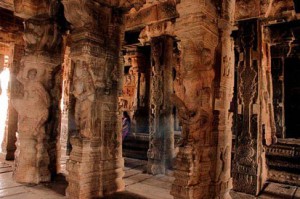The Vijayanagar Empire caused a number of monuments to be built and patronized in the State of Andhra Pradesh. The ornate Lepakshi temples being one of the popular temples of that era. Lepakshi is a small village, which lies nine miles east of Hindupur in Anantapur District of Andhra and is famous for its temple of Veerabhadra, and is also a renowned place where the best specimens of the mural paintings of the Vijayanagar kings are available.
 The flat stuccoed granite ceilings of the Vijayanagar Empire provided a suitable background for frescoes as seen at Lepakshi. This temple is a notable example of the Vijayanagar style of architecture, and is built on a low rocky hill, which is called Kurmasaila so called because the bill is like a tortoise, in shape. An inscription on the exit of the outer wall of the temple records that one Virupanna constructed it in the 16th century. The beautiful sculptures on the prakaram attract the pilgrims’ attention. These include 14 forms of Siva, like Dakshinamurthi, Ardhanareeswara, Tripurantaka etc. The hall of creepers is another excellent work of art, which has provided perennial inspiration to textile designers over the years. About 500m, North-East of the temple stands India’s largest monolithic Nandhi, measuring about 8.25m long and 4,60m high.
The flat stuccoed granite ceilings of the Vijayanagar Empire provided a suitable background for frescoes as seen at Lepakshi. This temple is a notable example of the Vijayanagar style of architecture, and is built on a low rocky hill, which is called Kurmasaila so called because the bill is like a tortoise, in shape. An inscription on the exit of the outer wall of the temple records that one Virupanna constructed it in the 16th century. The beautiful sculptures on the prakaram attract the pilgrims’ attention. These include 14 forms of Siva, like Dakshinamurthi, Ardhanareeswara, Tripurantaka etc. The hall of creepers is another excellent work of art, which has provided perennial inspiration to textile designers over the years. About 500m, North-East of the temple stands India’s largest monolithic Nandhi, measuring about 8.25m long and 4,60m high.